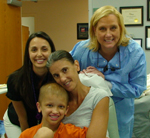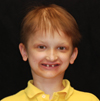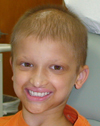|
|

|
Boy appreciates his million dollar smile
|
by Maggie Mullen
Public Relations
When you nod to a passing person on the street or greet an old friend
after many years, one of the first features that catches your eye might
be their pearly whites. Most of us take a simple smile for granted. Not
9-year-old Kobe Pellenz.
Kobe, a fourth grader from Daniel Island, has Ectodermal Dysplasia
(ED), a genetic disorder that leaves him with sparse hair, thin nails,
little sweating and many missing teeth.
His parents, John and Linda Pellenz, first noticed this at the early
age of 4 months. Kobe had a severe 109 degree fever, was rushed to East
Cooper Hospital after seizing, and later transferred to MUSC in August
2000. This is where the relationship with Kobe, the Pellenz family and
MUSC began.
“We are very fortunate and grateful for the wonderful doctors who have
helped us through this long, long process,” said his mom, Linda.
A major aspect of Kobe’s condition is malformed teeth. Since birth, his
teeth failed to develop normally, which affected everything from eating
to speech. Prior to seeking treatment, Kobe had only six permanent
teeth. As Kobe grew, his teeth came in pointed, missing or widely
spaced because of defective enamel. Most children with this condition
require dental care at a young age and multiple denture replacements
throughout childhood and adolescence.
 Kobe with mom Linda, Dr. Betsy Davis, back right, and Dr. Mary Leathers. Kobe with mom Linda, Dr. Betsy Davis, back right, and Dr. Mary Leathers.
MUSC’s team of dental specialists, lab technicians and dental
assistants within the Division of Maxillofacial Prosthetics and
dentists at the Department of Pediatric Dentistry in the College of
Dental Medicine have already treated more than two dozen patients like
Kobe. The collaboration between his family, school staff and dental
providers makes Kobe’s story a success.
“Kobe’s success story is a great example of what can be achieved with
interdisciplinary care at MUSC,” said Mary Leathers, DMD, assistant
professor of pediatric dentistry in the College of Dental Medicine.
  Left photo: Kobe Pellenz before his treatment at MUSC. In the right photo, Kobe has a million dollar smile thanks to MUSC staff. Left photo: Kobe Pellenz before his treatment at MUSC. In the right photo, Kobe has a million dollar smile thanks to MUSC staff.
His journey began in 2000 when Kobe was a patient of Carlos Salinas,
DMD, professor of pediatric dentistry in craniofacial genetics, College
of Dental Medicine. Salinas referred the young patient to Leathers, who
became his primary dental provider in pediatric dentistry. She reshaped
his sharp teeth and then collaborated with Betsy Davis, DMD, associate
professor in the Department of Otolaryngology-Head and Neck
surgery and director of the Maxillofacial Prosthetics Clinic, to
form his dentures. After a yearlong process of visits and denture
fittings, Kobe received his first set of dentures by the start of third
grade. He continues to see Melissa Montiel Potemra, a speech language
pathologist, who is helping him improve his eating and speaking skills.
“Young patients like Kobe bring me joy in the work that I do,” said
Davis. “Helping Kobe and others gain the confidence they need and enjoy
everyday experiences throughout childhood makes a difference in their
lives.”
The challenge is not over for Kobe. He will continually need to relearn
how to eat, drink and speak again. “Now I have a million dollar smile,”
said Kobe, who got his second set of dentures just prior to the start
of school last August. “I’m not used to eating with my new teeth, but I
still get to eat my favorite foods, turkey and cheese!”
To help diagnose children affected by ED learn how to live with their
condition and overcome obvious social issues, the family attended the
National Foundation for Ectodermal Dysplasias in Virginia and was
able to meet and interact with other ED families. This collaboration
helped Kobe, the Pellenz family and others learn how to socialize with
other children and adults living with this condition.
“It was hilarious because this was the first time we couldn’t recognize
Kobe in a swimming pool full of children. He looked like every other
kid,” said his mom.
Unfortunately, as Kobe grows, his dentures will not, which means that
his care will continue to be an ongoing process that affects his family
both physically and financially. According to Davis, Kobe’s teeth will
continually need to be reshaped and refitted for dentures until he
reaches adulthood.
Kobe’s younger brother, Noah, 3, was diagnosed with the same genetic
disease at a very early age and will soon be seeking the same level of
dental care and collaborative expertise in the next few years.
Friday, April 9
|
|
|





